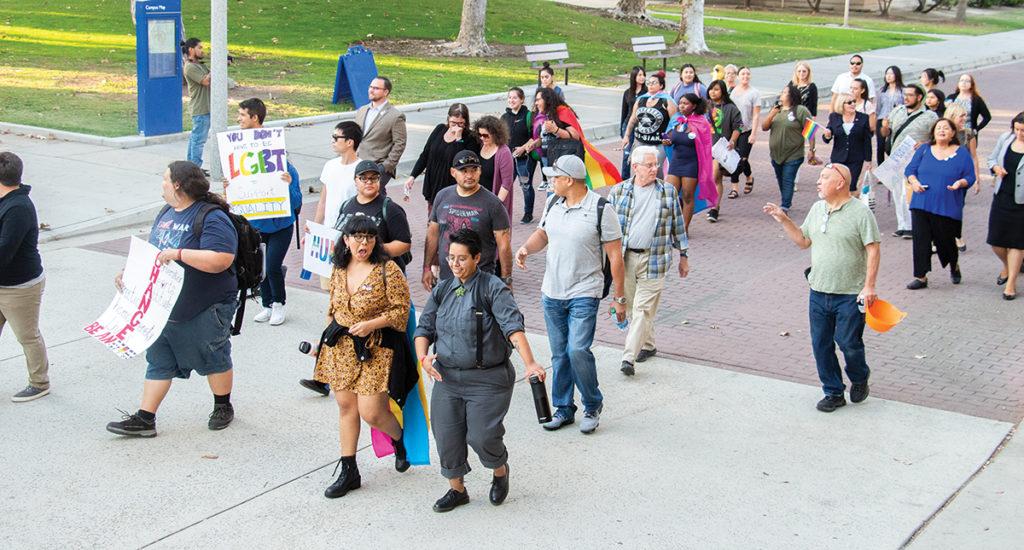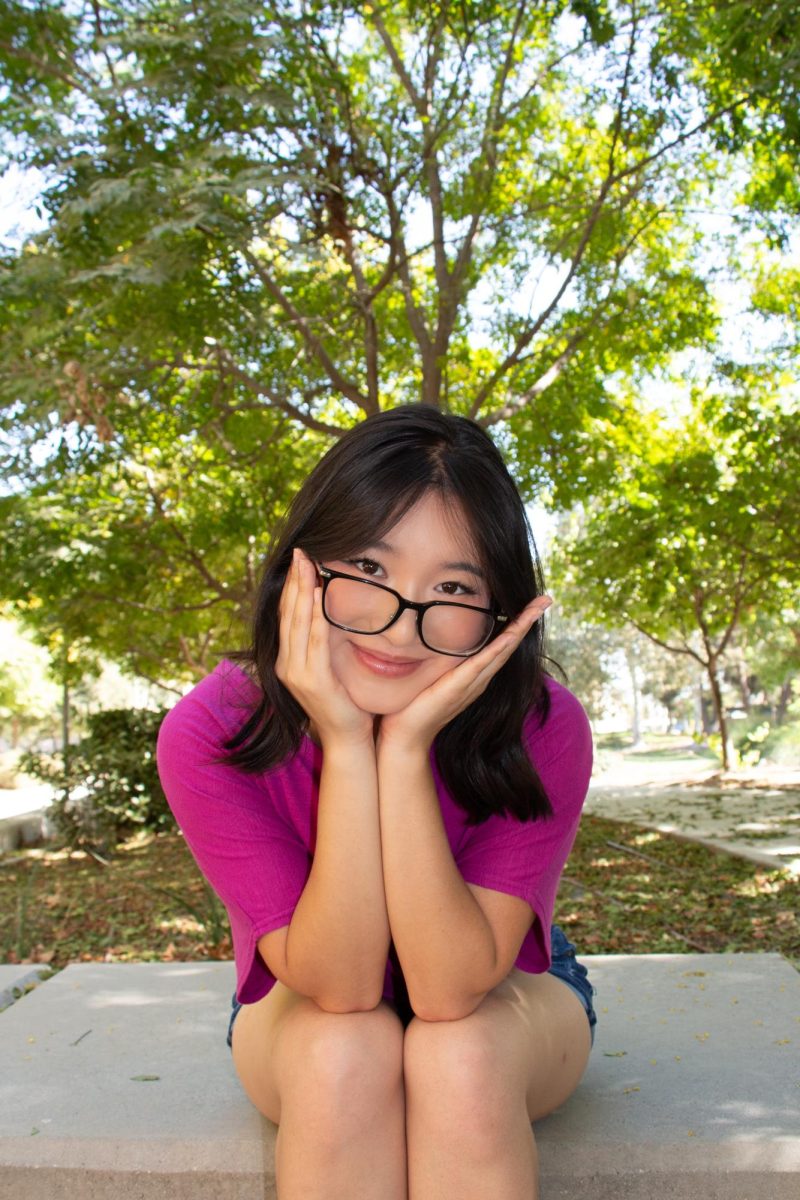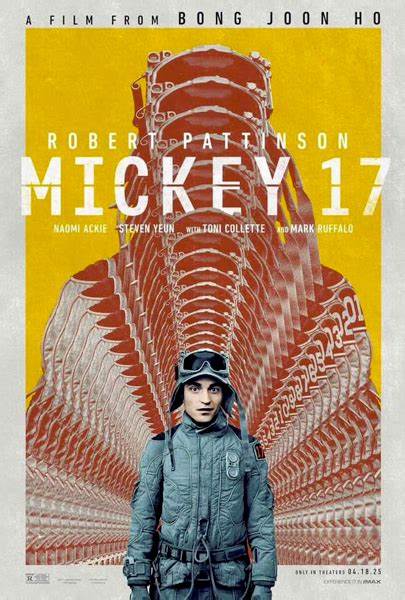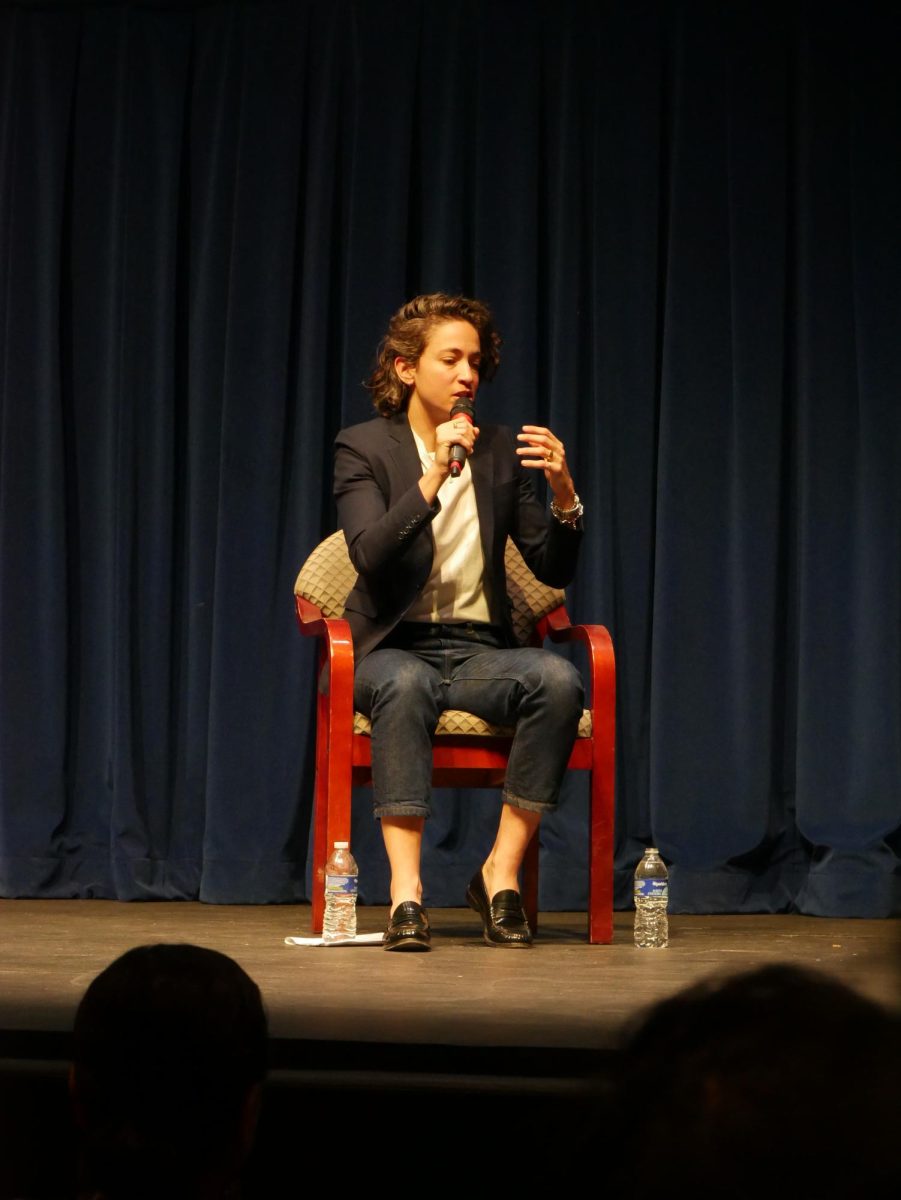Features Editor
Editor’s note: This article has been corrected to reflect that ClubGen is not a “women-centered organization” but one that works toward the equality of all genders. Genders of students that identified as non-binary have also been corrected.
With obstacles like homophobia and stereotypes, members of the Kern County’s LGBT community may feel like they live in a hostile environment. CSU Bakersfield’s Campus Programing partnered with gender and sexuality focused clubs on campus to host Pride Week to show those in the community that there is support for them in such a politically conservative environment.
CSUB’s 2018 Pride Week began on Oct. 8 with the Campus Programing’s resource fair that invited LGBT community members to the Red Brick Road to learn more about the clubs and centers that cater to them. People could have participated in a game night, listened to a panel discussion at the Ally Rally or shared their coming out story at the expression night.
These events and more were in promotion of CSUB’s campus as a safe zone.
An ally is a straight supporter of the LGBT community. A safe zone is a community in which homophobia, transphobia, and sexism—among other discriminatory practices—is not tolerated.
Sexual orientation and gender identity are not the same thing. Sexual orientation is the relational attraction, or lack thereof, to someone else. A person’s gender identity is their internal sense of their self as a male, female, both, or neither.
While it’s more commonly referred to as the shorter LGBT, the LGBTQ+ acronym is a more wide-ranging term that includes the sexualities and gender identities beyond lesbian, gay, bisexual, and transgender. The LGBTQ+ community consists of people who are intersex, asexual, pansexual, bigender, gender queer and any other self-identifying terms.
It is worthy to note that pedophilia, and other variations of an adult’s attraction to a minor, are not included nor supported within the community.
Queer was originally a slur used against the members of the community, that they have since reclaimed. Junior ethnic studies major Brianna Santaella is the vice president of ClubGen, an organization that focuses on gender and sexuality issues.
“The word ‘queer’ in itself isn’t an open invitation for everyone to use,” Santaella said. “The way we use queer is more we’re reclaiming that word ourselves.”
Senior liberal studies major Vanessa Zepeda is the president of the CSUB LGBTQ+ Network Club. Zepeda and the club helped detail the week-long event. She hoped that this year’s Pride Week would show everyone that being queer is supported on campus if not in their own home.
“I know people whose parents are real Republican base, homophobic and they don’t even want to come out to their family, because they’d be disowned or kicked out,” Zepeda said. “[The parents’] will love their friends that are gay, but when it comes to their own child, it’s a totally different story.”
Kern County has a history of violence and discrimination against members of the queer community.
Jan Hefner is the executive director for the Center for Sexuality and Gender Diversity.
“Gay murder was a thing at one time back in the 1970’s,” Hefner said in a phone interview. “There were at least eight murders of gay men recorded between 1978 and 2002 in Kern County.”
One particular case was in 1981, when businessman William Robert Tyack shot and murdered his gay neighbors Jack Blankenship and Sidney Moses Wooster during a confrontation. After claiming he was afraid of the unarmed men, a jury acquitted Tyack of murder, and convicted him on the lesser charge of involuntary manslaughter.
Times have changed since as being gay or lesbian has become more widely accepted.
“We don’t have too much challenges with lesbians and gay men because most people at large know someone who has come out as lesbian or gay,” Hefner said.
She continued that not too many people know someone who’s bi or pan, nor do they understand the spectrum that is sexuality.
“Everyone, even straight cisgender people, has a sexual orientation and gender identity,” Hefner said. “Not just the LGBTQ.”
Cisgender means that a person identifies as the gender assigned to them at birth.While public perception of gay people is relatively more positive than it was just forty years ago, the wider community doesn’t understand what being a transgender person is like.
Transgender and gender non-conforming people face violence that other less visible LGBTQ+ individuals do not. The Human Rights Campaign, a queer civil rights organization, reported 22 cases of a trans person’s death due to violence in the United States in 2018 so far.
For members of the LGBTQ+ community, the struggles of being queer are multiplied by the disenfranchisement that comes with being a person of color.
This is called intersectionality, which Hefner defined as an overlap of cultural marginalization that stems from each aspect of identity.
Rene Upton is a junior art major and the public relations officer for ClubGen. He is a white transman.
“It’s unfortunate, but we do have to point out certain minority groups are more at risk than others,” Upton said. “A black trans woman walking down the street is more likely to be hurt or beaten or killed in this county than maybe me.”
Bre Parks, who is a junior communications major, is also a pansexual and black. A pansexual is a person that can be attracted to someone regardless of gender, that may mean someone who identifies as trans or gender fluid, this can also be called bi plus.
She described the black community’s reception of the LGBTQ+ as a trash fire.
“There’s this really strange notion in the black community that non-heterosexual people can only be white,” Parks said. “Just trying to come out to someone who thinks like that is almost impossible because they’re going to just be like ‘well you’re not gay, that’s for white people.’”
Along with misconceptions about LGBTQ+ believed by others, some members of color believe there is not enough representation of the diversity in the community.
Anthony Hernandez is a junior communications major and gay man.
“I think all you see is pretty—this is going to sound bad but like—pretty white boys who are like so put together and that doesn’t represent the LGBT community,” he said.
He described himself as not “full-on feminine” but not masculine at all either. He said that in a community like Bakersfield where masculinity is what’s sought after, he feels like he doesn’t fit it.
Senior psychology and woman, gender, and sexuality studies major Samantha De La Cruz is ClubGen’s president. From policing and gate-keeping, she said that there are issues within the community as well.
“Like any other community, we’re disjointed,” De La Cruz said.
The Ally Rally served as a open forum for allies, those who were curious, and LGBTQ+ members to come together to dispel the myths that surround the community. Myths included that one can’t be gay without having “gay experiences”—which is false—and that a queer person can’t be religious.
Senior sociology major and Ally Rally panelist Delila Solis used their own experiences as a spiritual and queer person to dispel that myth. She said that a relationship with God isn’t based on a set of rules, but is about oneself.
Teaching people how to be a better ally was another objective of Pride Week. For those who want to learn more about identity and sexuality, De La Cruz suggested CSUB students to take a class.
“We have amazing professors,” said De La Cruz. “The classes aren’t just feminists that are angry. The classes are diverse.”
Being a better ally includes not being defensive if someone calls you out for using a particular word. For example, the word ‘tranny’ is just as offensive as the word ‘blackie’ is racist.
“Just say ‘I didn’t know that.’ Admit your fault and then learn from it,” De La Cruz said.
For people questioning their sexuality who want to meet other LGBTQ+ people outside of a bar, or want to volunteer, the Center for Sexuality and Gender Diversity is located at 902 18th St. in Bakersfield. There is also a more discreet office location, for directions call the center at (661) 843-7995.








